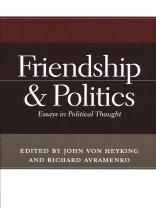Throughout the history of Western political philosophy, the idea of friendship has occupied a central place in the conversation. It is only in the context of the modern era that friendship has lost its prominence. By retrieving the concept of friendship for philosophical investigation, these essays invite readers to consider how our political principles become manifest in our private lives. They provide a timely corrective to contemporary confusion plaguing this central experience of our public and our private life.
This volume assembles essays by well-known scholars who address contemporary concerns about community in the context of philosophical ideas about friendship. Part One includes essays on ancient philosophers including Plato, Aristotle, and Cicero. Part Two considers treatments of friendship by Christian thinkers such as Augustine, Aquinas, Luther, and Calvin, and Part Three continues with Thomas Hobbes, Montaigne, the American founders, and de Tocqueville. The volume concludes with two essays that address the postmodern emphasis on fragmentation and the dynamics of power within the modern state.
Contributors: John von Heyking, Richard Avramenko, James M. Rhodes, Stephen M. Salkever, Walter Nicgorski, Jeanne Heffernan Schindler, Thomas Heilke, Timothy Fuller, Travis D. Smith, George Carey, Joshua Mitchell, and Jürgen Gebhardt.
关于作者
Richard Avramenko is assistant professor of political science at the University of Wisconsin, Madison. He is the co-editor, with John von Heyking, of Friendship and Politics: Essays in Political Thought (University of Notre Dame Press, 2008).












